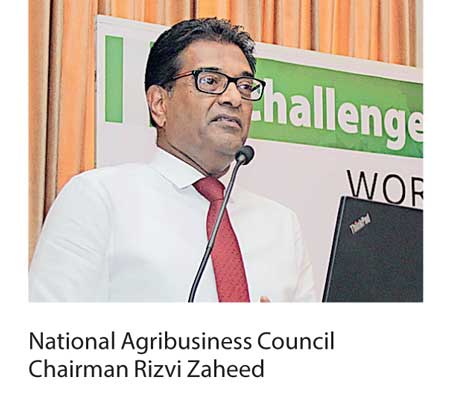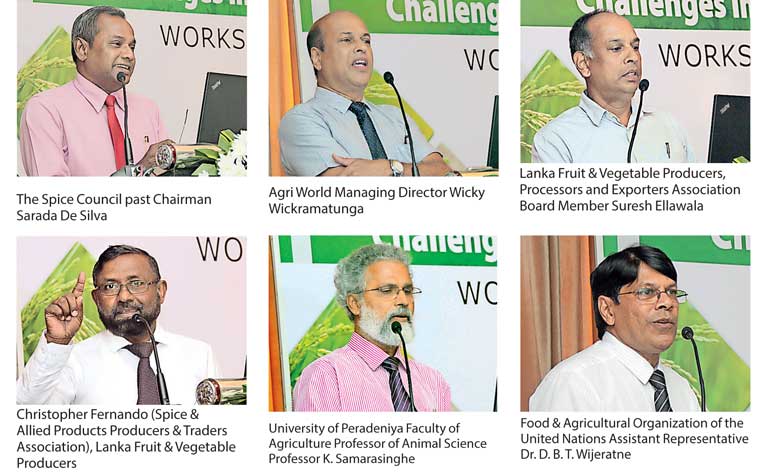Wednesday Feb 25, 2026
Wednesday Feb 25, 2026
Friday, 19 May 2017 00:10 - - {{hitsCtrl.values.hits}}
 Agriculture stands at the core of Sri Lankan society and economy with 30% of the population involved in agriculture. Though GDP contribution from agriculture hovers at around 10%, the influence of agriculture on every fabric of Sri Lankan life is very significant.
Agriculture stands at the core of Sri Lankan society and economy with 30% of the population involved in agriculture. Though GDP contribution from agriculture hovers at around 10%, the influence of agriculture on every fabric of Sri Lankan life is very significant.
Successive governments have made substantial investments and implemented various programs to develop the national agriculture sector. In spite of all these efforts the county annually spends over 200 billion to import food.
The productivity levels of most of the sub sectors in agriculture are much below potential and one of the top priorities of the Government is to address this crucial issue without any further delay.
Sri Lanka at various times over the years has tried to address the issue of food security and food nutrition while ensuring sustainable incomes to farmers and ensuring returns to all stakeholders. The focus on sustainability and innovation in agriculture too hasn’t achieved traction. Hence, sadly, agriculture has not taken off to the levels required, given the opportunities and potential to develop this important sector.
The time is therefore opportune and urgent to put every effort to increase productivity in the entire agriculture sector and thought leadership at a new level is now required to propel agriculture into a new paradigm.
The National Agribusiness Council, which is the apex body of the agriculture sector,is driving this initiative with the involvement and participation of all stakeholders. With a view to address the specific issue, a workshop and a media briefing was held on 16May at The Kingsbury, Colombo under the patronage of the National Agribusiness Council and participation of key stakeholders in the agriculture sub sectors.
Explaining the objectives of this initiative, Chairman of the National Agribusiness Council, Rizvi Zaheed said this initiative seeks to disseminate the extensive knowledge and experience available in Sri Lanka and communicate this in an effective and participative way so that action could be taken and coordinated in a holistic manner. The ideas and insights have provided a strong foundation for required action to take agriculture in Sri Lanka to a new level.
Immediate Past Chairman Weerakoon said that productivity is the key to propel agriculture development in the country which prompted the NAC to select the theme of the event as ‘Challenges in Agriculture’.
The seminar focused on identifying various impediments and to see ways and means in increasing the productivity levels in the entire agriculture sector. Weerakoon further said: “Sri Lanka’s agricultural productivity is surprisingly low and this vital sector cannot create new jobs to attract youth, while services and industry are five to six times more productive. The country needs almost to double the present agricultural productivity levels including the plantation sector as well.”
Irrespective of the sector contribution to the GDP the agricultural sector’s mobilisation to Sri Lanka’s employment is still quite significant despite a decline in its share with the expansion of the industrial and services sectors in recent years. The agricultural sector absorbs nearly 30%of the total labor force in the country while utilising 43% of the total land area. The sector remains as the mainstay of the rural economy in Sri Lanka, thus indicating its influence to the national economy.
While the efforts at introducing responsible agriculture through initiatives such as Sri Lanka Good Agriculture Practices (SLGAP) have to be lauded, the gains in productivity must of necessity come from an approach of sustainable agriculture which takes care of farmer livelihoods, stakeholder returns and the environment. The need for developing and sustaining global and domestic agri value chains is now critical and required thought leadership and action in a renewed manner.
Export earnings from agricultural products from Sri Lanka have been increasing in value terms, with the share of agricultural exports in total exports hovering around 25%. Domestic agriculture still provides approximately 80% of Sri Lanka’s food requirement in value terms.
However, the immediate need at present is to undertake the much-needed policy reforms in order to effectively contribute to a sustained growth while enhancing farmer and producer incomes while mitigating existing constraints and future challenges. The focus of improving productivity is thus critical and the key areas identified and discussed at the workshop is the appropriate way forward.

